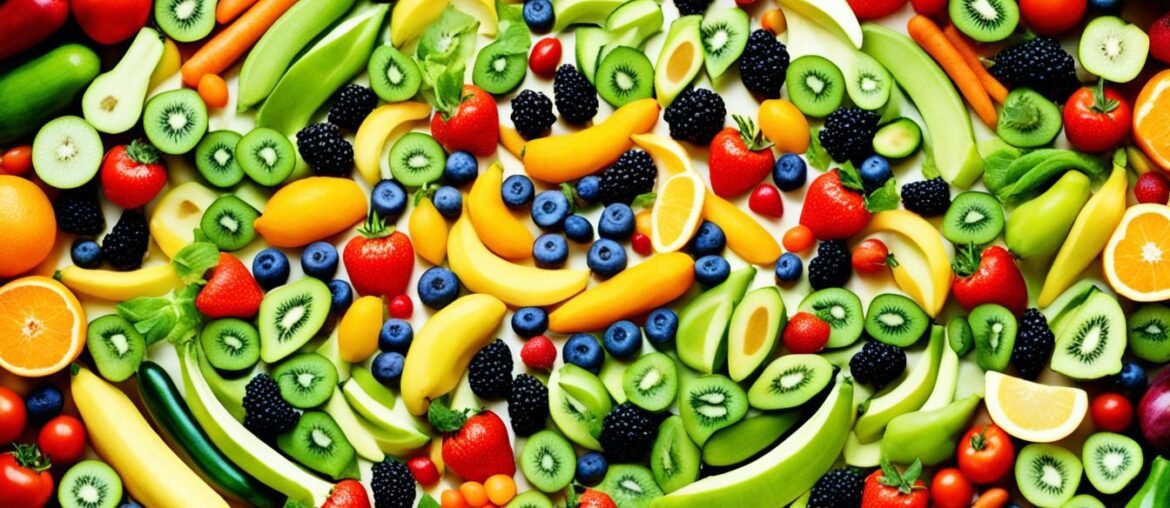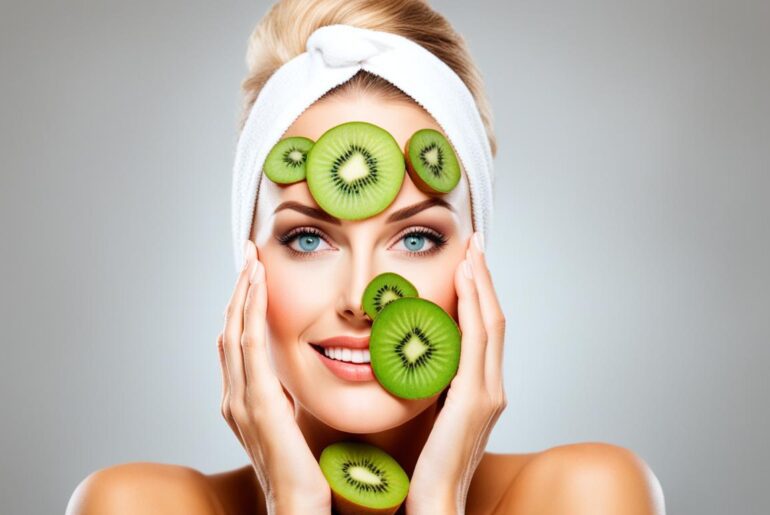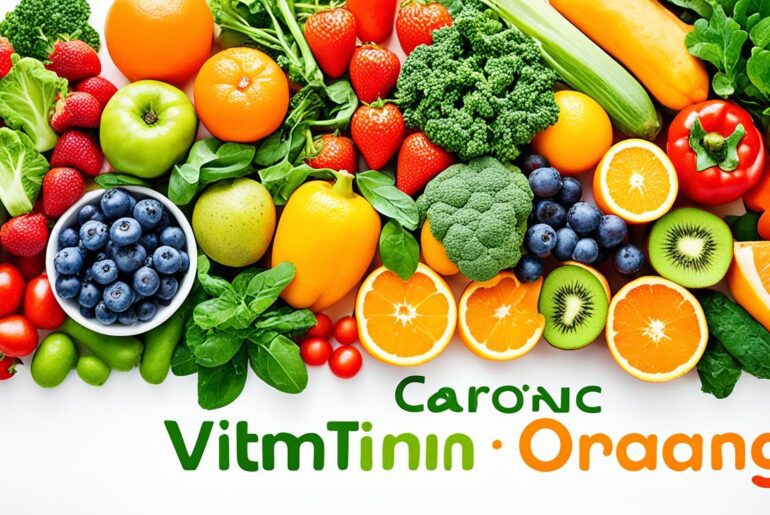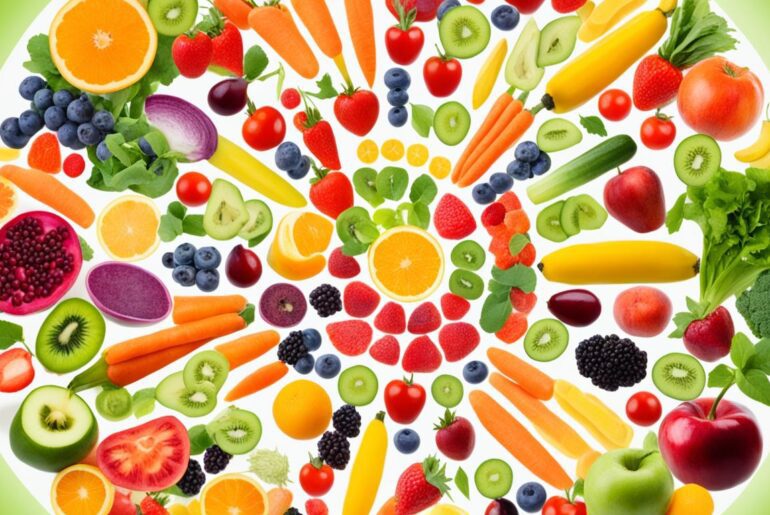Are you looking for the best natural vitamins to slow down the aging process and achieve youthful, healthy skin? Well, look no further! In this article, I will explore the benefits of natural vitamins for skin antiaging and the top supplements you should consider adding to your skincare routine.
As we age, our skin undergoes various changes that can lead to wrinkles, fine lines, and a dull complexion. While aging is inevitable, there are ways to support healthy skin and reduce the signs of aging. Natural vitamins have been found to be powerful allies in this quest, providing essential nutrients that nourish the skin from within and help promote a more youthful appearance.
In the following sections, I will delve into the science behind the aging process, explore the benefits of specific vitamins such as curcumin, EGCG, collagen, CoQ10, and vitamin C, and introduce other anti-aging supplements that can complement your skincare regimen.
Key Takeaways:
- Natural vitamins can help slow down the aging process and rejuvenate the skin.
- Curcumin, EGCG, collagen, CoQ10, and vitamin C are key anti-aging vitamins.
- Other supplements like vitamin E, theanine, selenium, zinc, resveratrol, omega-3 fatty acids, and green tea extract also show potential in supporting healthy aging.
- More research is needed to fully understand the long-term effects and optimal dosages of these supplements.
- By incorporating natural vitamins into your skincare routine, you can nourish your skin from within and achieve a more youthful appearance.
Understanding the Aging Process
As we age, our bodies undergo various changes that can impact our overall health and appearance. It’s essential to understand the underlying causes of aging to support healthy aging and slow down its effects. Two key factors in the aging process are cellular damage and telomeres.
Cellular damage occurs due to the accumulation of free radicals in the body. Free radicals are unstable molecules that can cause oxidative stress and damage to our cells, leading to various age-related conditions. This damage can affect vital organs, including the skin, brain, and heart.
Telomeres, on the other hand, are protective caps that sit at the ends of our chromosomes, specifically the DNA strands. Think of them as the shoelace tips that keep our DNA from unraveling. However, with each cell division, telomeres naturally shorten. Eventually, when the telomeres become too short, the cell can no longer divide and becomes senescent or dies.
To support healthy aging and slow the effects of aging, we can make certain dietary and lifestyle changes. These changes can help mitigate cellular damage and maintain the health and length of telomeres.
Ways to Support Healthy Aging:
- Follow a balanced diet rich in antioxidants: Antioxidants help neutralize free radicals and reduce oxidative stress. Include fruits, vegetables, nuts, and seeds in your diet.
- Stay physically active: Regular exercise can improve cardiovascular health, maintain muscle mass, and support overall well-being.
- Manage stress: Chronic stress can accelerate the aging process. Practice relaxation techniques like meditation, yoga, or deep breathing exercises.
- Get enough sleep: Quality sleep is crucial for cellular repair and regeneration. Aim for 7-9 hours of uninterrupted sleep per night.
- Avoid smoking and excessive alcohol consumption: These habits can accelerate cellular damage and harm overall health.
The Role of Nutrition:
Nutrition plays a vital role in healthy aging. Certain nutrients, such as vitamins and minerals, can support cellular health and slow down the aging process. Some key nutrients include:
- Vitamin C: This antioxidant vitamin helps protect against cellular damage and supports collagen production for healthy skin.
- Vitamin E: Another antioxidant that can protect against free radicals and support overall cellular health.
- Omega-3 fatty acids: Found in fatty fish like salmon, omega-3 fatty acids have anti-inflammatory properties that can benefit various aspects of health, including brain function and heart health.
Remember, supporting healthy aging is a holistic approach that involves multiple factors, including diet, exercise, stress management, and adequate rest. By making conscious choices and prioritizing your well-being, you can slow down the effects of aging and enjoy a healthier, more vibrant life.
Vitamins and Minerals to Support Healthy Aging
| Vitamin/Mineral | Main Sources | Benefits |
|---|---|---|
| Vitamin C | Citrus fruits, berries, peppers | Antioxidant, collagen production |
| Vitamin E | Nuts, seeds, vegetable oils | Antioxidant, cellular health |
| Omega-3 Fatty Acids | Fatty fish (salmon, mackerel), chia seeds, walnuts | Anti-inflammatory, heart and brain health |
Curcumin – The Golden Antioxidant

Curcumin, the active compound in turmeric, is a powerful antioxidant that offers numerous benefits for healthy aging. Its antioxidant effects help protect against cellular damage, reducing the risk of age-related diseases and promoting longevity. Research has shown that curcumin has the ability to activate proteins that play a crucial role in delaying cellular senescence, the biological aging process.
Studies have highlighted curcumin’s potential to combat cellular damage and increase lifespan. Its ability to activate proteins has been linked to the promotion of healthy cellular functions and the preservation of cellular integrity. By activating these proteins, curcumin effectively protects against the damaging effects of free radicals and supports overall cellular health.
“Curcumin’s activation of proteins helps delay cellular senescence, promoting longevity and contributing to healthy aging.”
Turmeric intake, which contains curcumin, has also been associated with a reduced risk of age-related cognitive decline. The powerful antioxidant properties of curcumin help protect the brain from cellular damage and inflammation, contributing to improved cognitive function and maintaining brain health as we age.
To fully explore the benefits of curcumin and incorporate it into your anti-aging routine, consider including turmeric in your diet or taking curcumin supplements. However, it is important to consult with a healthcare professional before starting any new supplement regimen.
Curcumin is a remarkable substance that holds great promise in the field of healthy aging. Its antioxidant properties and ability to activate proteins make it a valuable addition to any anti-aging strategy.
| Benefits of Curcumin | Sources |
|---|---|
| Powerful antioxidant effects | Turmeric, curcumin supplements |
| Activation of proteins that delay cellular senescence | Turmeric, curcumin supplements |
| Combat cellular damage and increase lifespan | Turmeric, curcumin supplements |
| Reduced risk of age-related cognitive decline | Turmeric, curcumin supplements |
Remember, curcumin is just one of the natural vitamins and supplements that can support healthy aging. In the next sections, we will explore other powerful anti-aging compounds and their benefits for maintaining youthful and vibrant skin.
EGCG – The Green Tea Powerhouse
When it comes to natural antiaging compounds, Epigallocatechin gallate (EGCG), found in green tea, is a true powerhouse. This polyphenol compound has gained attention for its ability to improve mitochondrial function and induce autophagy, a process that helps remove damaged cellular material, promoting cellular rejuvenation and overall health.
Studies have shown that EGCG enhances mitochondrial function, the powerhouse of our cells responsible for energy production. By optimizing mitochondrial function, EGCG helps improve cellular energy metabolism and enhances overall cellular health.
But that’s not all! EGCG also activates autophagy, a cellular process that acts like a garbage disposal system, eliminating damaged proteins and organelles. This mechanism not only promotes cellular rejuvenation but also prevents the accumulation of harmful substances that can lead to cell dysfunction and aging.
Green tea, which is rich in EGCG, has been linked to various antiaging benefits, including protection against aging skin. UV light exposure can cause damage to the skin, leading to hyperpigmentation and premature aging. However, studies have shown that EGCG has photoprotective properties, acting as a shield against UV-induced skin damage and reducing hyperpigmentation caused by sun exposure.
To visually capture the benefits of EGCG, take a look at the image below:
| Benefits of EGCG | References |
|---|---|
| Improves mitochondrial function | Reference 1 |
| Induces autophagy | Reference 2 |
| Reduces aging skin and hyperpigmentation | Reference 3 |
Green tea, with its high content of EGCG, is a natural and delicious way to incorporate this powerful compound into your daily routine. Whether enjoyed as a warm cup of tea or used in skincare products, EGCG can help protect your skin from premature aging and promote overall cellular health.
Collagen – Building Blocks for Youthful Skin
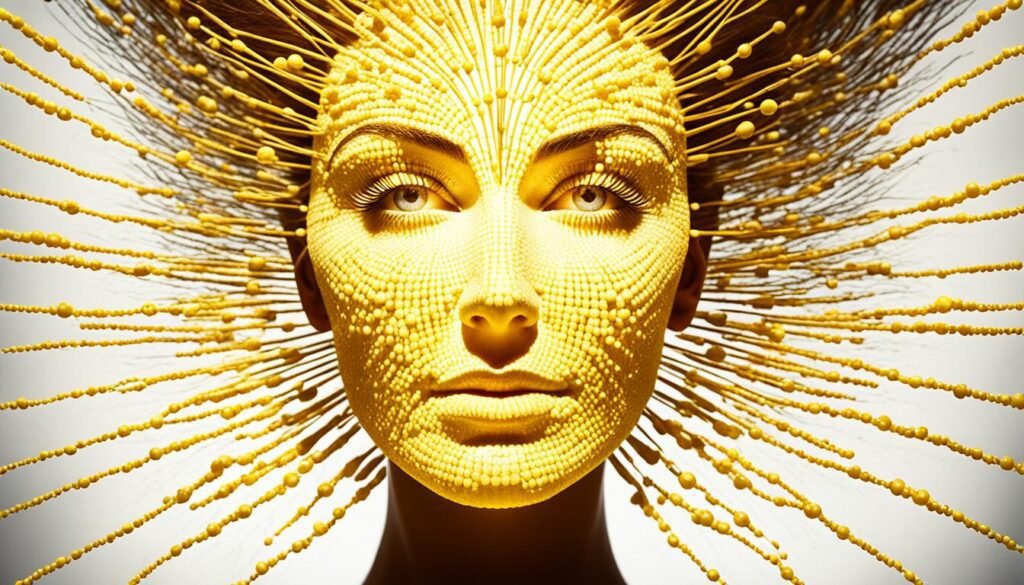
Collagen is a crucial protein that plays a major role in maintaining the structure and elasticity of the skin. It is responsible for keeping our skin firm, smooth, and youthful-looking. However, as we age, the production of collagen naturally slows down, leading to visible signs of aging such as wrinkles, fine lines, and sagging skin.
Fortunately, there are ways to combat the effects of collagen depletion and reduce the signs of aging. One effective method is to supplement with collagen. By providing your body with additional collagen, you can help replenish the levels that naturally decline over time.
Studies have shown that collagen supplementation can have a significant impact on improving skin hydration, reducing roughness, and enhancing elasticity. It can also help minimize the appearance of wrinkles and fine lines, giving your skin a more youthful and vibrant look.
Collagen supplements come in various forms, including powders, capsules, and liquids. They are typically derived from sources such as bovine (cow), porcine (pig), or marine (fish) collagen. When choosing a collagen supplement, it’s important to opt for a high-quality product that is sourced from reputable manufacturers.
In addition to collagen supplements, there are other ways to promote collagen production naturally. Consuming foods rich in collagen-boosting nutrients, such as vitamin C, amino acids, and antioxidants, can support the production of collagen in the body. Some examples include citrus fruits, berries, leafy greens, and lean proteins.
| Benefits of Collagen Supplementation: |
|---|
| Improves skin hydration |
| Reduces roughness |
| Enhances skin elasticity |
| Minimizes the appearance of wrinkles and fine lines |
It’s important to note that while collagen supplements can be beneficial for improving skin health, they may not deliver the same results for everyone. Factors such as individual differences, lifestyle habits, and overall health can influence the effectiveness of collagen supplementation.
Before starting any new supplement regimen, it’s always a good idea to consult with a healthcare professional, especially if you have any underlying medical conditions or are taking medications that may interact with collagen supplements.
CoQ10 – Cellular Energy and Protection
Coenzyme Q10 (CoQ10) is an antioxidant that plays a vital role in energy production and protects against cellular damage. With its ability to neutralize harmful free radicals, CoQ10 helps maintain the overall health and functionality of cells throughout the body.
Supplementing with CoQ10 has been shown to have numerous benefits, especially in older adults. The antioxidant properties of CoQ10 help improve the quality of life by reducing the risk of age-related diseases and mitigating the effects of oxidative stress.
One area where CoQ10 shines is heart health. Studies have demonstrated that CoQ10 supplementation can reduce stiffness in arteries, lower blood pressure, and improve overall cardiovascular function. By boosting the energy production within the heart muscle cells, CoQ10 supports healthy heart function and can reduce the risk of heart disease.
But the benefits of CoQ10 don’t end there. It also has a positive impact on physical and mental deterioration that often comes with aging. CoQ10 can enhance exercise performance, improve mood, and support overall brain health. Its ability to protect against oxidative stress enables CoQ10 to maintain cognitive function and potentially reduce the risk of age-related cognitive decline.
In summary, CoQ10 is an essential antioxidant that plays a crucial role in cellular energy production and protection. Supplementing with CoQ10 can improve the quality of life for older adults, benefit heart health, and help reduce physical and mental deterioration associated with aging.
As stated by medical professionals, CoQ10 is an essential antioxidant that can improve the quality of life and benefit heart health. Its cellular protection properties make it an excellent supplement for overall well-being.
Nicotinamide Riboside and Nicotinamide Mononucleotide – Restoring NAD+ Levels

Nicotinamide riboside (NR) and nicotinamide mononucleotide (NMN) are NAD+ precursors that can help restore NAD+ levels in the body. These compounds have shown to delay age-associated cellular changes and lengthen telomeres, which play a central role in the aging process. More research is needed to fully understand the long-term effects in humans.
Nicotinamide riboside (NR) and nicotinamide mononucleotide (NMN) are two compounds that have gained attention for their potential to delay cell aging and promote longevity. These compounds belong to a class of molecules known as NAD+ precursors.
NAD+ (nicotinamide adenine dinucleotide) is a coenzyme found in all living cells that plays a crucial role in various physiological processes, including energy production, DNA repair, and cellular metabolism. However, NAD+ levels naturally decline with age, which has been linked to age-associated changes and an increased risk of age-related diseases.
Research suggests that supplementing with nicotinamide riboside and nicotinamide mononucleotide can help restore NAD+ levels and counteract age-related cellular changes. These compounds are believed to work by replenishing the body’s NAD+ levels and supporting its various functions.
Studies have shown that increasing NAD+ levels through nicotinamide riboside and nicotinamide mononucleotide supplementation can delay cellular senescence, which is the process of irreversible cell cycle arrest associated with aging. By delaying cellular senescence, these compounds may help to maintain the integrity and functionality of cells, tissues, and organs.
In addition, nicotinamide riboside and nicotinamide mononucleotide have also been found to lengthen telomeres, which are protective structures at the ends of chromosomes. Telomeres naturally shorten with each cell division and are considered a marker of cellular aging. By lengthening telomeres, nicotinamide riboside and nicotinamide mononucleotide may help slow down the aging process and support overall cellular health.
It is important to note that while studies have shown promising results in animals and some small-scale human trials, more research is needed to fully understand the long-term effects and optimal dosage of nicotinamide riboside and nicotinamide mononucleotide supplementation in humans.
In conclusion, nicotinamide riboside and nicotinamide mononucleotide hold promise as potential interventions to delay age-associated cellular changes and promote healthy aging. However, it is always recommended to consult with a healthcare professional before starting any new supplementation regimen.
Crocin – The Golden Antioxidant from Saffron

Crocin, a pigment found in saffron, is a powerful antioxidant that offers numerous health benefits. It has been extensively studied and has shown remarkable abilities to combat cellular damage, reduce inflammation, and protect against UV damage. These properties make crocin an excellent addition to any anti-aging regimen.
Saffron, derived from the flower of Crocus sativus, is one of the most coveted and expensive spices in the world. It has been used for centuries in traditional medicine for its medicinal properties. Crocin, its main bioactive compound, is responsible for the characteristic golden color of saffron and its potent antioxidant effects.
Studies have shown that crocin possesses strong free radical scavenging abilities, which help combat oxidative stress and prevent cellular damage. By protecting cells from harmful free radicals, crocin can slow down the aging process and reduce the risk of age-related diseases.
In addition to its antioxidant properties, crocin also has potent anti-inflammatory effects. Chronic inflammation is a significant contributor to aging and age-related diseases. By reducing inflammation, crocin helps maintain healthy cellular function and supports overall well-being.
Furthermore, crocin has been found to protect against UV damage, which is a leading cause of skin aging. UV radiation can cause DNA damage, collagen degradation, and the formation of free radicals, all of which accelerate skin aging. By shielding the skin from UV damage, crocin helps preserve its youthful appearance and vitality.
One of the most fascinating aspects of crocin is its potential to protect against age-related cognitive decline. Research has shown that crocin has neuroprotective properties and may help delay or prevent age-related cognitive impairments, such as Alzheimer’s disease.
The Benefits of Crocin:
- Combats cellular damage
- Reduces inflammation
- Protects against UV damage
- Supports healthy aging
- Preserves youthful skin
- Helps prevent age-related cognitive decline
Crocin’s remarkable antioxidant, anti-inflammatory, and UV-protective properties make it a valuable addition to any anti-aging skincare routine. Whether consumed as a supplement or applied topically, crocin can help promote healthy aging and support overall well-being.
| Benefit | Description |
|---|---|
| Combat Cellular Damage | Crocin’s antioxidant properties help neutralize harmful free radicals and protect cells from oxidative stress. |
| Reduce Inflammation | Crocin has potent anti-inflammatory effects, which can help alleviate chronic inflammation and support overall well-being. |
| Protect Against UV Damage | Crocin shields the skin from UV radiation, preventing DNA damage, collagen degradation, and premature aging. |
Vitamin C – The Skin Savior
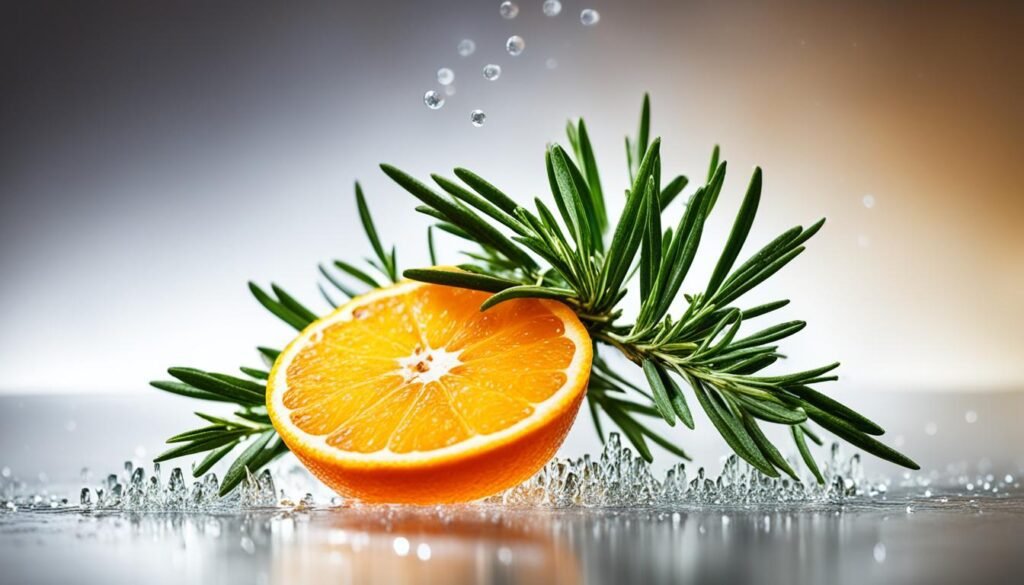
Vitamin C is a powerful antioxidant that plays a crucial role in maintaining skin health. It offers a range of benefits, including stimulating collagen production and protecting against sun damage. Additionally, vitamin C has wound-healing and anti-inflammatory properties, and it can even improve immune function.
Collagen is a protein that provides structure to the skin, helping to keep it firm and youthful. Vitamin C plays a vital role in the synthesis of collagen, promoting its production and maintaining the integrity of the skin’s structure. By incorporating vitamin C into your skincare routine, you can support collagen production and reduce the signs of aging, such as fine lines and wrinkles.
Another significant benefit of vitamin C is its ability to protect the skin against sun damage. As an antioxidant, vitamin C helps to neutralize harmful free radicals generated by UV radiation. This protection can help prevent the development of sunspots, hyperpigmentation, and other sun-induced skin problems. Pairing vitamin C with sun protection measures, such as wearing sunscreen, can provide enhanced defense against the damaging effects of the sun.
In addition to its role in collagen synthesis and sun protection, vitamin C also has wound-healing properties. It aids in the production of new skin cells, which can help speed up the healing process of cuts, scrapes, and other skin injuries. Furthermore, vitamin C’s anti-inflammatory effects can reduce redness and swelling, promoting faster recovery.
Boosting your intake of vitamin C can have a positive impact on both your skin’s appearance and overall health. It is recommended to incorporate vitamin C-rich foods into your diet, such as citrus fruits, berries, leafy greens, and bell peppers. Additionally, topical vitamin C products, such as serums and creams, can be applied directly to the skin for targeted benefits.
By harnessing the power of vitamin C, you can support your skin’s health, promote collagen production, protect against sun damage, and enhance the overall appearance of your complexion.
Other Anti-Aging Supplements
In addition to the previously mentioned natural vitamins, there are several other supplements that have shown promise in supporting healthy aging and promoting youthfulness. These supplements include vitamin E, theanine, selenium, zinc, resveratrol, omega-3 fatty acids, and green tea extract. Each of these supplements possesses unique properties that contribute to their anti-aging effects.
Vitamin E is a powerful antioxidant that helps protect against cellular damage caused by free radicals. It plays a crucial role in maintaining skin health by promoting collagen production and reducing oxidative stress. Vitamin E can be found in various foods such as nuts, seeds, and vegetable oils.
Theanine, an amino acid found in tea leaves, has been studied for its potential anti-aging effects. It is known for its calming properties and ability to promote relaxation. Theanine can help reduce stress and improve cognitive function, thereby supporting overall well-being and healthy aging.
Selenium is a trace mineral that acts as an antioxidant and supports the immune system. It helps protect cells from oxidative damage and plays a role in thyroid function. Selenium can be obtained from foods such as seafood, Brazil nuts, and eggs.
Zinc is an essential mineral that is involved in many enzymatic processes in the body. It plays a crucial role in immune function, wound healing, and DNA synthesis. Zinc is found in foods like oysters, beef, and legumes.
Resveratrol is a compound found in certain plants and fruits, such as grapes and berries. It has been studied for its potential anti-aging effects, including its ability to activate sirtuins, a group of proteins involved in regulating cellular processes. Resveratrol may contribute to improved cardiovascular health and support longevity.
Omega-3 fatty acids are essential fats that are beneficial for heart health and brain function. They have anti-inflammatory properties and can help reduce the risk of chronic diseases associated with aging. Omega-3 fatty acids are commonly found in fish, flaxseeds, and walnuts.
Green tea extract contains catechins, including the powerful antioxidant EGCG. It has been shown to have anti-aging effects, including protection against UV damage and improvement in skin health. Green tea extract is available in supplement form and can also be enjoyed as a beverage.
| Supplement | Benefits | Food Sources |
|---|---|---|
| Vitamin E | Powerful antioxidant, supports skin health | Nuts, seeds, vegetable oils |
| Theanine | Promotes relaxation, improves cognitive function | Tea leaves |
| Selenium | Antioxidant, supports immune system | Seafood, Brazil nuts, eggs |
| Zinc | Essential for enzymatic processes, supports immune function | Oysters, beef, legumes |
| Resveratrol | Activates sirtuins, supports cardiovascular health | Grapes, berries |
| Omega-3 Fatty Acids | Supports heart health, reduces inflammation | Fish, flaxseeds, walnuts |
| Green Tea Extract | Protects against UV damage, improves skin health | Green tea |
Conclusion
Conclusive summary, natural vitamins for skin antiaging. Natural vitamins play a significant role in supporting healthy aging and rejuvenating the skin. Supplements like curcumin, EGCG, collagen, CoQ10, and vitamin C have been shown to have antiaging effects.
However, it’s important to note that more research is needed to fully understand the long-term effects and optimal dosages of these supplements for antiaging purposes. While these natural vitamins show promise in promoting youthful skin and delaying the effects of aging, it is always advised to consult with a healthcare professional before incorporating any new supplements into your routine.
By prioritizing a balanced diet rich in natural vitamins and adopting a healthy lifestyle, you can take proactive steps in supporting your skin’s health and overall well-being. Remember to nourish your body from the inside out, as true antiaging begins with a holistic approach to wellness.
FAQ
Can natural vitamins slow down the aging process?
While aging is a natural process that cannot be stopped, natural vitamins can help slow down the effects of aging on the body. Certain vitamins have been shown to have antiaging properties and can provide essential nutrients to support healthy skin and rejuvenate the complexion.
What causes the aging process?
The aging process is primarily caused by accumulated cellular damage from free radicals and the shortening of telomeres. Free radicals are reactive molecules that can cause harm to cells, while telomeres play a role in cellular division.
How can I support healthy aging?
Supporting healthy aging involves making dietary and lifestyle changes to slow the effects of aging on the body. This can include consuming natural vitamins with antiaging properties, exercising regularly, maintaining a healthy diet, managing stress, and getting enough sleep.
What is curcumin and how does it help with aging?
Curcumin is the active compound found in turmeric and has powerful antioxidant effects. It has been shown to activate proteins that help delay cellular senescence and promote longevity. Curcumin also combats cellular damage and has been associated with a reduced risk of age-related cognitive decline.
What is EGCG and how does it benefit aging?
EGCG is a polyphenol compound found in green tea. It improves mitochondrial function and induces autophagy, the process of removing damaged cellular material. EGCG intake is linked to a reduced risk of aging skin and reduced hyperpigmentation caused by UV light.
How does collagen help with youthful skin?
Collagen is a protein that helps maintain skin structure. However, the production of collagen slows down with age, leading to signs of aging like wrinkles. Supplementing with collagen has shown to reduce these signs of aging and improve skin hydration, roughness, and elasticity.
What is CoQ10 and how does it protect against aging?
CoQ10 is an antioxidant that plays a vital role in energy production and protects against cellular damage. Supplementing with CoQ10 has been shown to improve the quality of life in older adults, reduce physical and mental deterioration, and benefit heart health by reducing stiffness in arteries and lowering blood pressure.
How do nicotinamide riboside and nicotinamide mononucleotide help with aging?
Nicotinamide riboside (NR) and nicotinamide mononucleotide (NMN) are NAD+ precursors that can help restore NAD+ levels in the body. These compounds have shown to delay age-associated cellular changes and lengthen telomeres, which play a central role in the aging process.
What is crocin and how does it protect against aging?
Crocin is a pigment found in saffron that has been shown to combat cellular damage, reduce inflammation, and protect against UV damage. It offers many health benefits, including anti-aging effects and protection against age-related cognitive decline.
How does vitamin C benefit the skin?
Vitamin C is a powerful antioxidant that supports skin health by stimulating collagen production and protecting against sun damage. It also has wound-healing and anti-inflammatory effects and can improve immune function.
What are some other anti-aging supplements?
In addition to the mentioned vitamins, other supplements that have shown potential in supporting healthy aging include vitamin E, theanine, selenium, zinc, resveratrol, omega-3 fatty acids, and green tea extract. These supplements have antioxidant and anti-inflammatory properties and can improve various aspects of health related to aging.

